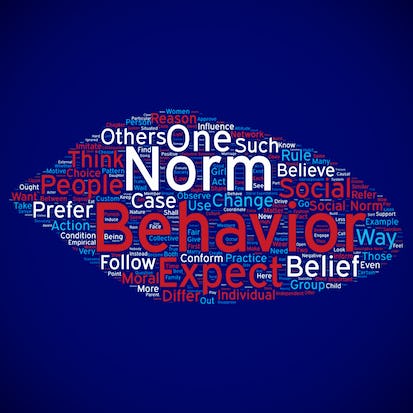- Level Foundation
- المدة 13 ساعات hours
- الطبع بواسطة University of Pennsylvania
-
Offered by

عن
This is a course on social norms, the rules that glue societies together. It teaches how to diagnose social norms, and how to distinguish them from other social constructs, like customs or conventions. These distinctions are crucial for effective policy interventions aimed to create new, beneficial norms or eliminate harmful ones. The course teaches how to measure social norms and the expectations that support them, and how to decide whether they cause specific behaviors. The course is a joint Penn-UNICEF project, and it includes many examples of norms that sustain behaviors like child marriage, gender violence and sanitation practices. This is Part 1 of the Social Norms, Social Change series. In these lectures, I introduce all the basic concepts and definitions, such as social expectations and conditional preferences, that help us distinguish between different types of social practices like customs, descriptive norms and social norms. Expectations and preferences can be measured, and these lectures explain how to measure them. Measurement is crucial to understanding the nature of the practice you are facing, as well as whether an intervention was or was not successful, and why. In Part 2, we will put into practice all we have learned in Part 1. New! Please use this link for a 30% discount on the recommended book that accompanies this course! https://global.oup.com/academic/product/9780190622053/?cc=us&lang=en&promocode=AAFLYG6الوحدات
Interdependent & Independent Behavior
1
Assignment
- Quiz #1: Independent and Interdependent Behavior
1
Discussions
- Customs in practice
7
Videos
- Introduction to Interdependent and Independent Behavior
- 1.1
- 1.2
- 1.3
- 1.4
- 1.5
- 1.6
4
Readings
- What makes a behavior independent versus interdependent?
- What is a custom?
- How do the concepts of interdependent and independent behavior apply in the wild?
- What are social expectations?
Empirical Expectations
1
Assignment
- Quiz #2: Empirical Expectations
1
Discussions
- Descriptive norms in practice
6
Videos
- Introduction to Empirical Expectations
- 2.1
- 2.2
- 2.3
- 2.4
- 2.5
3
Readings
- What are empirical expectations?
- How do unilateral and multilateral expectations relate to imitation and coordination?
- What is a descriptive norm?
Normative Expectations
1
Assignment
- Quiz 3: Normative Expectations
1
Discussions
- Normative Expectations in Practice
5
Videos
- Introduction to Normative Expectations
- 3.1
- 3.2
- 3.3
- 3.4
3
Readings
- What are Normative Expectations?
- Sanctions
- Reference Network Dependence
Personal Normative Beliefs
1
Assignment
- Quiz 4: Personal Normative Beliefs
1
Discussions
- Personal Normative Beliefs in Practice
4
Videos
- Introduction to Personal Normative Beliefs
- 4.1
- 4.2
- 4.3
3
Readings
- Non-Prudential Personal Normative Beliefs
- Personal Normative Beliefs vs. Normative Expectations
- Attitudes vs. Personal Normative Beliefs
Conditional Preferences
1
Assignment
- Quiz 5: Conditional Preferences
1
Discussions
- Conditional preferences in practice
5
Videos
- Introduction to Conditional Preferences
- 5.1
- 5.2
- 5.3
- 5.4
1
Readings
- What makes a preference a conditional preference?
Social Norms
1
Assignment
- Quiz 6: Social Norms
1
Discussions
- Social norms in practice
6
Videos
- Introduction to Social Norms
- 6.1
- 6.2
- 6.3
- 6.4
- 6.5
3
Readings
- What is a social norm?
- How do sanctions relate to social norms?
- How can we diagnose a collective practice?
Pluralistic Ignorance
1
Assignment
- Quiz 7: Pluralistic Ignorance
1
Discussions
- Pluralistic Ignorance in Practice
4
Videos
- Introduction to Pluralistic Ignorance
- 7.1
- 7.2
- 7.3
3
Readings
- What is Pluralistic Ignorance?
- Whether We are Facing Pluralistic Ignorance is an Empirical Question
- Possibilities for Tackling Pluralistic Ignorance
Measuring Norms
2
Assignment
- Quiz 8A: Measuring Norms, Part 1
- Quiz 8B: Measuring Norms, Part 2
1
Discussions
- Measuring Norms in Practice
8
Videos
- Introduction to Measuring Norms
- 8.1
- 8.2
- 8.3
- 8.4
- 8.5
- 8.6
- Closing
6
Readings
- Measurement: From the Lab to the Field
- Hypotheticals and Belief-Expectation Manipulation
- Measuring Beliefs and Expectations
- Measuring Social Conditionality of Preference
- Limits of Traditional Surveys and Solutions
- Vignettes
Auto Summary
Unlock the secrets of social norms in "Social Norms, Social Change I," a foundational course in Personal Development by Coursera. Guided by UNICEF and Penn experts, you'll learn to diagnose, measure, and influence social norms to drive effective policy changes. Ideal for those interested in societal behaviors like child marriage and gender violence, this 780-minute course offers foundational concepts and practical tools for impactful interventions. Join now with a Starter subscription and start making a difference today!

Cristina Bicchieri


